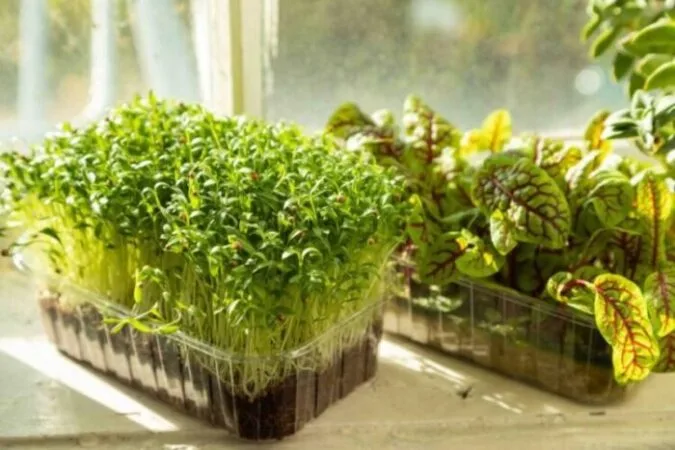Table of contents
Cilantro Growing Guide
This Cilantro growing guide is to help you produce your own cilantro or coriander at home. This herb is tasty and healthy so it is worth the effort.
If you love Asian-inspired cooking, coriander is a ‘must have’ in your garden.
In North America ‘cilantro’ (the Spanish word for coriander leaves) is used to describe the leaves and stem of this plant. However, the dried seeds of the plant are called ‘coriander’ seeds.

Cilantro Growing from Seed
Time needed: 4 minutes
How to grow cilantro.
- Choose the right soil.
Choose loose, well drained soil as your growing medium.
- When to grow
Plant at the start of the dry season in the tropics. April or May is usually good.
- Sow Seeds
Sow seeds 1cm (half an inch) deep and cover with soil.
- Water
Make sure the soil is moist but not waterlogged. Roughly 2.5cm (1in) of water per week is ideal for seedlings.
- Harvesting
You can harvest once your plant is 15cm (6in) tall. Do not take more than a third of the leaves at a time. To harvest seeds, you have to allow the plant to flower and dry out, before shaking the seed head in a paper bag.
How to Grow Cilantro from Cuttings
Growing cilantro (also known as coriander) from cuttings can be a bit challenging compared to other herbs, as cilantro doesn’t root as easily. However, with the right conditions and care, it is possible.
- Select Healthy Cuttings: Choose healthy cilantro stems from a plant that is free of pests and diseases. The stems should be about 20cm (5in) long and have a few sets of leaves.
- Prepare the Cuttings: Use clean, sharp scissors or pruning shears to cut the cilantro stems just below a node (the point where leaves meet the stem). Remove the lower leaves from the bottom 2 inches of the stem, leaving a few sets of leaves at the top.
- Place the Cuttings in Water: Fill a clear glass jar or container with fresh water. Place the cilantro cuttings in the water, making sure the lower part of the stem is submerged but the leaves are above the water. Place the container in a bright location with indirect sunlight.
- Change the water every few days to keep it fresh and prevent stagnation.
- Monitor for Root Growth: It can take a couple of weeks for cilantro cuttings to start developing roots. Look for small white roots emerging from the submerged part of the stems.
- Transplanting the Cuttings: Once the roots are about 5cm (2in) long, the cuttings are ready to be transplanted into soil.
How to grow cilantro indoors
Growing cilantro indoors can provide you with a steady supply of fresh herbs year-round. Follow the above step-by-step guide, noting the following tips:
- Rotate the Pots: If using natural sunlight, rotate the pots every few days to ensure even light exposure and prevent the plants from leaning towards the light source.
- Avoid Overcrowding: Proper spacing is essential for airflow and preventing diseases.
- Watch for Pests: Keep an eye out for common indoor pests like aphids and spider mites. Use insecticidal soap or neem oil if necessary.
- Prevent Bolting: Cilantro can bolt quickly in high temperatures. Keeping the plants in cooler conditions and regularly harvesting can help delay this process.
By following these steps and maintaining the right conditions, you can successfully grow cilantro indoors and enjoy fresh, flavorful leaves in your cooking year-round.
Cilantro growing time
Cilantro leaves are ready to harvest 45 to 70 days after seeding. Cut exterior leaves once they reach 20cm (5in) long.
Cilantro growing season
In the tropics cilantro is best planted at the start if the ‘dry season’. Seeds germinate in about 21 days and grow 1-3 feet tall. Cilantro can also be started indoors 4-6 weeks before transplanting.
Cilantro growing temperature
Cilantro grows best in cooler temperatures between 50°F to 70°F (10°C to 21°C).
Avoid placing the plants in areas with temperature fluctuations or drafts.
Growing Cilantro in Pots
Here in the tropics we recommend growing cilantro in pots or a container bed. This will avoid the problem of your plants sitting in soggy ground for long periods during the wet season.
Cilantro growing stages
How to maintain cilantro plant
Cilantro grows well in both the tropics and sub-tropics, given the right conditions.
Location and Soil
Plant in full sun, or at least where the plant will get sun for a good part of the day. Loose well draining soil is best for this plant.
Fertilising
Fertilising your plants with a balanced fertiliser is a good idea. We apply this in the form of a water soluble fertiliser every month or so.
Watering
You should water your plants at least twice each week.
Pests and Diseases
Cilantro growing tips must include pest management. So pests include whitefly, caterpillar, aphids, thrips and mites. However, you can apply ‘white oil’ to address these pests. White oil is an organic pesticide that you can make yourself at home.
Health Benefits
High blood sugar is a known risk factor for type 2 diabetes. Coriander seeds are known to help lower blood sugar.
In addition, coriander is rich in antioxidants and has been shown to reduce inflammation in the body.
Further, there is evidence that coriander seed oil promotes healthy digestion. Studies have shown a coriander-containing herbal medication taken thrice daily significantly decreased abdominal pain, bloating, and discomfort.
In conclusion we hope you have found our cilantro growing tips useful.
Other Tropical Herbs
- Dill
- Ginger Growing
- Grow Basil at Home
- Garlic Chives Growing
- Lemongrass Growing
- Mint
- Stevia
- Thai Chili Plant
- Vietnamese Mint


Comments
4 responses to “Cilantro Growing: Your Ultimate Guide”
[…] Cilantro […]
[…] Cilantro […]
[…] Cilantro […]
[…] Cilantro […]